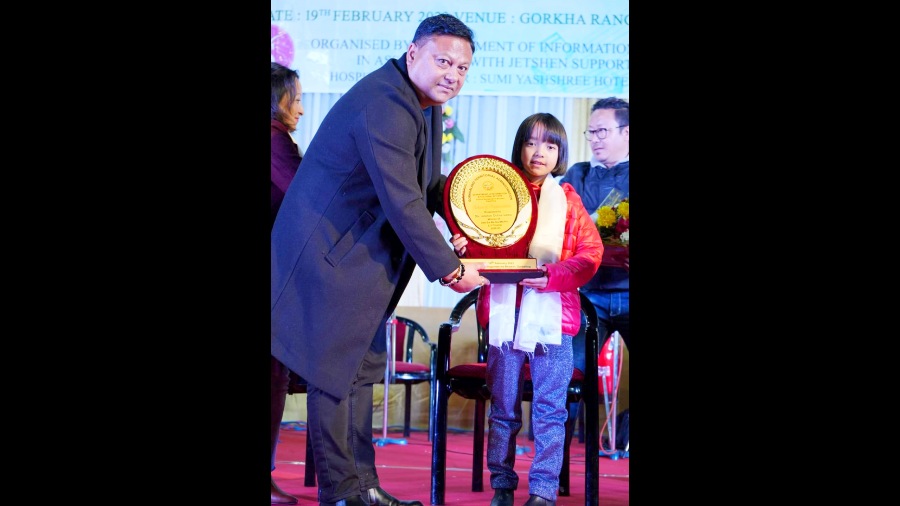Singing sensation Jetshen Dohna Lama, who recently won the TV reality show Sa Re Ga Ma Li’l Champs, provided leaders of the ruling parties of the Darjeeling hills and Sikkim with an opportunity to sing a new tune on the identity issue of Nepali-speaking Indians.
Proponents of the separate state of Gorkhaland say the provision for free movement of citizens between India and Nepal in each other’s country dilutes the Indian identity of Nepali-speaking Indians.
The identity crisis is one of the strong reasons cited for demanding Gorkhaland in India.
The Gorkhaland Territorial Administration (GTA) on Sunday felicitated Jetshen, along with Albert Kabo Lepcha, who was the first runner-up in another TV show Sa Re Ga Ma Pa hosted by Zee Bangla, a few months ago. Members of the pipe band of Thurbo Higher Secondary School, Mirik, were also felicitated for winning a national-level band competition in Delhi recently.
Addressing the event, Anit Thapa, GTA chief executive, broached the identity issue. “She (Jetshen) must shine on the international stages. This is our identity... the media ask me, you have an identity issue?. We have an identity, voter cards as everyone in our country. We have to stop saying we have an identity crisis. This is only a political issue, which has not helped our community,” said Thapa.
Thapa added that “Indian (central government), Bengal or Sikkim (governments) have never said (we are foreigners) but we move around saying this.”
“Jetshen is our identity. Such talents are our identity,” added Thapa.
The trigger for Thapa’s comment was provided by Jacob Khaling, political secretary to Sikkim chief minister P.S. Golay (Tamang) who had spoken ahead of Thapa.
Khaling thanked the people of Darjeeling for not only supporting Sikkim girl Jetshen but also during the controversy that erupted after the Supreme Court’s January 13 remark describing the Sikkimese Nepalis as those of “foreign origin”.
However, on February 8, the Supreme Court, after hearing pleas from the Union of India, the Sikkim government and third parties, removed the words “foreign origin” from its earlier observation.
“It was a landmark decision not only for Sikkim but also for Nepali-speaking people across India,” said Khaling.
The Sikkimese politician added that after the success of the agitation to include the Nepali language in the Eighth Schedule of the Indian Constitution (in 1992), the Supreme Court’s decision to remove the “foreign origin” words was the next milestone in cementing the Indian identity of Nepali-speaking Indians.
Khaling then asked for the issue to be looked at with a different perspective and approach.
“I want to say whether it is from Darjeeling, Kalimpong, the Dooars, northeastern states or Sikkm, we should stop saying that we are looked upon as foreigners. This issue has to be stopped. We have to start talking with conviction that we are Indian citizens. We have to claim and declare (our Indian identity),” said Khaling, adding that the rectification by the Supreme Court had cleared the tag of “foreign origin”.










